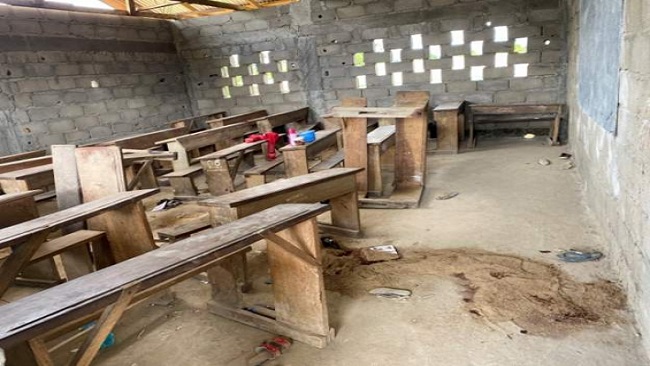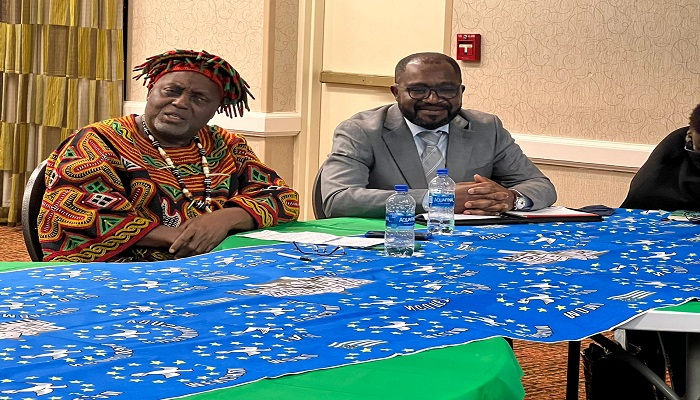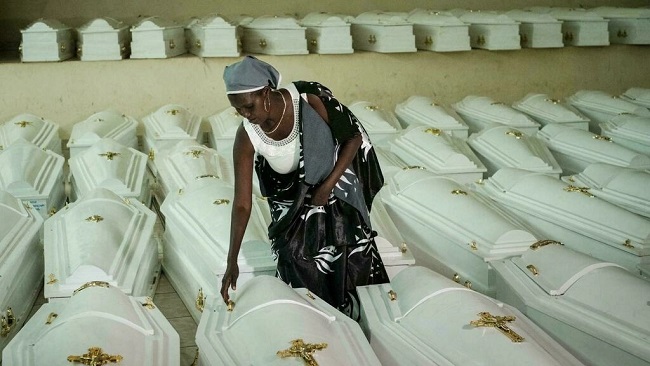17, February 2022
Southern Cameroons Crisis: UN weighs in on Manyu school attack 0
The Humanitarian Coordinator in Cameroon, Mr. Matthias Z. Naab is deeply concerned by two more attacks against schools in the South-West region.
On 8 and 11 February 2022, armed men from non-State armed groups burned down two schools, respectively the public primary school of Molyko in Buea, and Queen of Rosary Catholic College in Mamfe, both in the South-West region of Cameroon. These two incidents are the latest of several attacks on students, education staff and premises, depriving more than 700,000 students from their right to proper and safe education in the North-West and South-West regions.
“Education is a fundamental right to all children, yet many have not been allowed to enjoy this right. Children are traumatized, parents are scared, teachers and school administrators are afraid. With education under attack, the future of thousands of young Cameroonians is at risk. This is unacceptable,” said Mr. Naab. “Education establishments should be safe spaces for all students and teachers. Therefore, I call upon all perpetrators to refrain from actions that impede access to education, in accordance to Security Council Resolution 2601 (2021),” he added.
The United Nations and humanitarian partners in Cameroon condemn in the strongest terms all actions targeting education.
UN Office for the Coordination of Humanitarian Affairs





























17, February 2022
Southern Cameroons Crisis: As fighting persists, CDC workers are caught in the crossfire 0
Since 2016, for people in the restive English-speaking parts of Cameroon, each new year comes with the expectation of an end to the drawn-out separatist conflict. However, gratuitous violence rages on as the bloody war – which has so far killed over 5,000 people – continues unabated.
Barely two weeks into 2022, some nine workers at Cameroon’s largest agro-industrial company, the Cameroon Development Corporation (CDC), came face-to-face with death. They were toiling at the Sonne/Likomba Rubber Estate, one of CDC’s rubber plantations near the port town of Tiko in Southwest Cameroon, when gunmen abducted them, despite military protection. The kidnappers, who later claimed to be members of the Ambazonia Revolutionary Guards (one of several armed militia groups fighting to establish an independent, English-speaking state called Ambazonia) held them for 10 days in an undisclosed location.
The victims, including a lactating mother, were tortured, forced to carry assault rifles and grenades for the rebel fighters, and sing the national anthem of Ambazonia. In a video which was circulated on social media and seen by Equal Times, the plantation workers looked visibly hungry and dejected. Thankfully, they were eventually released without bodily injuries.
When their colleagues at the same estate were previously attacked at work, on two different occasions, the armed separatists beat them with machetes, inflicting serious bodily injuries. On one occasion, attackers asked six CDC plantation workers to place their fingers on tree trunks before chopping them off.
From the onset of the Anglophone crisis, separatists have been disrupting CDC operations as a form of economic sabotage. The CDC, which is engaged in the production of rubber, banana and palm oil for export, is the second biggest employer in Cameroon after the civil service.
Prior to the conflict, the state-run CDC was an important revenue stream for the government. The corporation generated 58.39 billion francs CFA (approximately US$101.8 million) from produce sales in 2016, according to CDC officials. But then, protracted fighting between increasingly bold armed separatists and government troops has forced the CDC to grind to a near-halt, seriously eroding the revenue base of the corporation. Since CDC plantations and factories are largely located in the troubled English-speaking Southwest region of Cameroon (one of two regions snared in the conflict, alongside the Northwest region), the conflict has dealt a heavy blow to the agricultural sector, and the CDC in particular, with its low-income plantation workers bearing much of the brunt of the chaos.
In 2016, before the outbreak of the conflict, CDC tells Equal Times that its workforce stood at 20,595. But as of 31 December 2021, this number had dropped to 15,505 workers, with about 50 per cent of the manpower on unpaid ‘technical leave’.
By 2019, only seven out of CDC’s 29 production sites were fully operational. Twelve had been shut down while 10 were partially functioning. This had an adverse impact on production capacity. For rubber, annual production fell from about 16,000 tons in 2016 to 4,507 tons in 2020. Palm oil production dropped from 22,375 tons in 2016 to 8,493 tons in 2020, while banana production fell from 113,858 to 6,178 tons over the same period.
Severally CDC processing plants have suffered from arson attacks. Meanwhile, separatists have also pitched their logistic and training camps in some plantations, forcing workers to abandon the farms. The disruption in activities saw CDC’s revenue plummet, and the company has since continued to default in the payment of its workers’ wages.
Quest for survival
As the fighting persists, many CDC workers have been caught in the crossfire. No fewer than 20 workers have been killed on and off duty since 2016, according to CDC trade unionists. Others have been exposed to violence as the corporation is unable to provide them with adequate security. Amid the insecurity and unpaid wages, some CDC workers, not keen to wait and see if the precarious situation will ever subside, have fled the country.
Twenty-nine-year-old Douon Basilise joined the CDC as a farm labourer in Tiko in 2014. She then rose to the rank of process control overseer, a position she held between 2016 and 2017 at CDC’s banana section. But insecurity and the uncertainty over wages was very bad for her morale.
“In September 2018, I met Amba fighters [armed separatists of the Ambazonia Defence Forces] on the field. As they approached me, I left everything in the changing room at Benoe Estate and took to my heels. I had to run for my life,” Douon discloses. That was the last time she ever set foot on a CDC plantation. With support from her family and friends, she ventured to the United Arab Emirates where she is currently exploring other opportunities.
Douon has described the working conditions of CDC employees, especially those in lower categories, as “extremely pathetic”. Not only do these workers often work additional jobs to make extra cash but they also live in dilapidated housing structures in camps that lack basic amenities.
Jonas Ebini Mbengtarh is another banana worker who has experienced the thorny issue of unpaid salaries at the CDC. He was owed 11 months of wages before being furloughed in September 2018. “My stay at the CDC was not the best,” Mbengtarh tells Equal Times, adding that he also contemplated embarking on a perilous journey to Europe.
“I was flat broke when I left the CDC. I decided to work in building construction sites as a general labourer for a meagre 2,500 francs CFA [approximately US$4.30] a day,” Mbengtarh says. He did this for 14 months to take care of his ageing parents and fiancée, before re-joining the CDC when the corporation restarted banana production.
For ordinary workers of the CDC, such as general labourers, the seemingly intractable situation means they have to lay their hands on anything they can to eke out a living. Some have heavily indebted themselves to get basic necessities such as food and clothing for their families, while others have resorted to additional menial jobs under extreme working conditions just to put food on their table. Some still work for the CDC though the corporation still owes them months of outstanding wages.
CDC in tight corner
Gabriel Mbene Vefonge, national president of the Cameroon Agricultural and Allied Workers Trade Union (CAAWOTU), which has over 2,500 CDC worker-members, says the situation is regrettable. Vefonge, who amongst other trade unionists had a meeting last October with the Prime Minister to discuss the issue of unpaid salaries, says the government is yet to give any concrete answers regarding full payment.
Vefonge also says that he regrets that socio-political tensions in Cameroon had caused an economic giant of CDC’s standing to fall to its knees, with several plantations currently in ruins. “CDC, over its more than 70 years of existence, has never gone through this kind of financial stress,” he says.
According to the workers’ representative, “working today as a CDC worker is a nightmare because all CDC workers are afraid to be killed while at their workplaces by unidentified gunmen. Their security and safety at work is not guaranteed, even with the presence of state security”.
Franklin Ngoni Njie, general manager of the CDC, acknowledges that “insecurity continues to be one of our major challenges”. He also tells Equal Times that the social climate at the CDC is currently tense, and that workers’ morale is not at the best as a result of the many months of salary arrears.
“Since May 2018, the corporation became unable to honour her commitments and has thus accumulated huge debts with workers – 27 billion francs CFA [approximately US$47 million],” Njie says.
The precarious situation has pushed CDC workers to go on several strikes in the plantation areas and in the capital city of Yaoundé.
Njie says the company is using its limited means to make payments to the workers who are actually working but did not specify the number. The corporation is also making efforts to offset its debt, he says. “The last time that the corporation successfully paid salaries and wages promptly to all its workers, amounting to 2.2 billion francs CFA [US$3.8 million] was in April 2018. Numerous reports have been made to the government on the explosive social climate in the corporation arising from the indebtedness to workers. From May 2018 to June 2021, a total of 20 billion francs CFA [US$34.8 million] has been paid out as salaries and wages, of which 11.74 billion francs CFA [ US$20.4 million] was received in 20 installments as grants from the government,” the GM says.
Njie also tells Equal Times that the corporation has provided 100 per cent medical coverage to its workers injured or maimed while at work, while those incapacitated have been redeployed to other duties. He also notes that while the coronavirus pandemic also affected production capacities, particularly for rubber and bananas, the CDC was still able to provide health coverage to its workers.
Culled from Equal Times